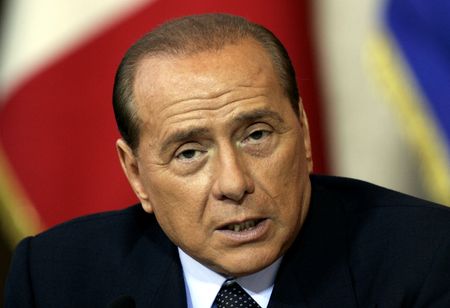 1
1 1
1
By Emilio Parodi, Elvira Pollina and Alvise Armellini
MILAN (Reuters) -Silvio Berlusconi, the billionaire media mogul and former Italian prime minister who transformed the nation’s politics with polarising policies and often alarmed his allies with his brazen remarks, died on Monday aged 86.
Berlusconi, Italy’s longest-serving premier who counted Russian President Vladimir Putin as a close friend and gained notoriety for his “bunga bunga” sex parties, had suffered from leukaemia and recently developed a lung infection.
He died at Milan’s San Raffaele hospital, where he was admitted on Friday. His five children, partner Marta Fascina and younger brother Paolo were with him, a hospital spokesperson said.
A state funeral will be held in Milan Cathedral on Wednesday, which the government declared a day of national mourning. Flags will fly at half mast until Wednesday.
Backed by huge wealth and his media empire, Berlusconi launched into politics in 1994, upending traditional parties and becoming premier. Another businessman, Donald Trump, would mirror that approach in the United States two decades later.
His death will send shockwaves through his Forza Italia party, a junior partner in Prime Minister Giorgia Meloni’s right-wing coalition, but could strengthen her leadership if she can win over his party lawmakers and supporters.
Berlusconi’s business empire, meanwhile, faces an uncertain future. He never publicly indicated who would take full charge of his companies, which include MFE, following his death, although his eldest daughter Marina is expected to play a prominent role.
PUTIN’S ‘TRUE FRIEND’
Berlusconi’s passing was mourned by political allies and rivals at home and leaders abroad, including Putin who said he was “a true friend. I have always sincerely admired his wisdom, his ability to make balanced, far-sighted decisions even in the most difficult situations”.
That relationship was one of many from Berlusconi’s colourful public and private life that caused a headache for allies and fodder for his foes.
Berlusconi refused to blame Putin for Russia’s 2022 invasion of Ukraine, saying Moscow only wanted to put “decent people” in charge. When Meloni was visiting Kyiv this year, she insisted Italy backs Ukraine regardless of remarks by any individuals.
On Monday, Meloni – who was a youth minister in one of Berlusconi’s governments – said: “We fought, won, lost many battles with him, and also for him we will bring home the goals that we had jointly set ourselves. Farewell Silvio.”
Enrico Letta, a former centre-left premier, wrote on Twitter: “Berlusconi made the history of our country. His death marks one of those moments in which everyone, whether or not they backed his choices, feels affected.”
Another former premier Mario Draghi, a non-partisan figure and one-time head of the European Central Bank, said Berlusconi “transformed politics and was loved by millions of Italians for his humanity and charisma”.
U.S. Secretary of State Antony Blinken extended his condolences to the family of Berlusconi and the Italian people, calling him “a tremendously significant figure in the life of Italy”.
MFE’s A- and B-shares jumped by as much as 10% after Berlusconi’s death was reported, with traders on the Milan bourse saying it could pave the way for the company to be sold or merged with a rival.
SCANDALS AND CONTROVERSIES
After building a real estate, soccer and television empire in the 1970s and 1980s, Berlusconi threw himself into politics, becoming prime minister four times – in 1994-95, 2001-05, 2005-06 and 2008-11 – despite multiple legal scandals.
When he last stepped down in 2011, Italy was close to a Greek-style debt crisis and his own reputation sullied by allegations that he had hosted “bunga bunga” sex parties with underage women, something he denied.
He was acquitted on appeal on all charges related to the parties, but was convicted of tax fraud in 2013, leading to a five-year ban on holding public office. He was still involved in one trial when he died.
Despite his health woes and the relentless court battles, Berlusconi refused to relinquish control of Forza Italia and returned to frontline politics, winning a seat in the European Parliament in 2019 and in the Italian Senate last year.
Perennially suntanned and vigorously promoted by his own media companies, Berlusconi brought his great skills as a salesman and communicator to the staid world of politics, offering a bright, optimistic outlook that voters lapped up.
His sense of humour often landed him in trouble, most recently in December when he told players of his Monza soccer team he would bring them “a bus of whores” if they beat a top Serie A rival. They went on to win.
Berlusconi is survived by 33-year-old Fascina, whom he called his wife despite not marrying her, two ex-spouses, five children, more than a dozen grandchildren and one great grandson.
(Reporting by Emilio Parodi, Giulio Piovaccari and Elvira Pollina; Writing by Alvise Armellini; Editing by Edmund Blair and Mark Heinrich)